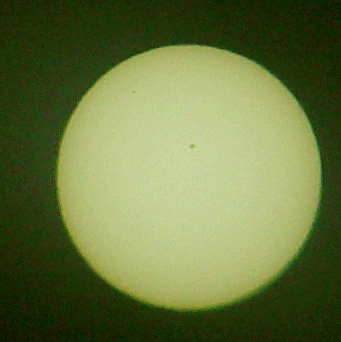Mercury Transit on May 7, 2003 Central Display and Webcam... We are online with you during the entire event DO NOT FORGET THAT IT IS DANGEROUS TO OBSERVE THE SUN WITHOUT SPECIAL PROTECTION! The only completely safe way is to project an image of the sun on a white surface (for instance, a piece of paper or cardboard). AFTER THE TRANSIT. |  | Sequence made using Binoculars and a digital camera by Chris Mullis. Mercury is the tiny moving dot in the upper part of the picture. In the center, a small group of sunspots is visible. Because of the slow rotation of the Sun (one rotation in about 25 days), they almost did not move during the full duration of the event. Their large apparent motion is only due to the misalignment and rotation of the image. See here a composite image obtained by the GONG network and showing the motion of the sunspots during the transit. technical setup: German WWII 10x80 binoculars (Rommel's Sahara force) fitted with mylar filters Sony F717 digital camera manually butted up to the eyepiece (afocal) sequence begins about 8:30am local time, approximately 1 hour after start of transit when Sun emerged from building occultation! sequence ends at 12:30pm local time many caveats: - no correction for field rotation - color and size variations in solar disk are processing artifacts - time-sampling is non-uniform It looked MUCH better viewed directly through the binoculars, but the time-sequence is a nice record of the event. |
previous images... 1 2 3 4 5 6 7 8 9 10 11 12 13 14 15
Recent Images Here is a collection of recent images obtained in different places. |
|
|
| | |